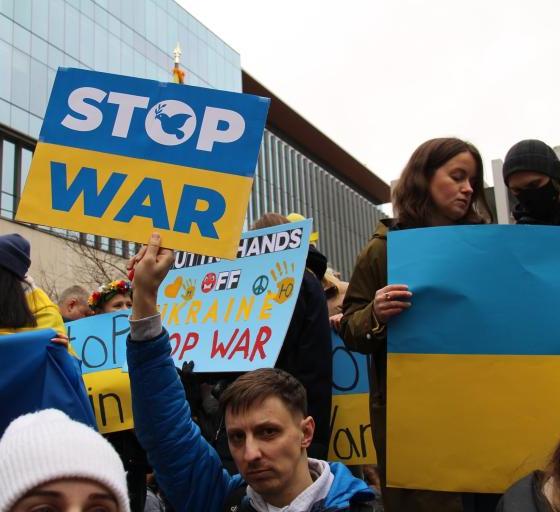
I don’t know how many pundits I’ve heard as they attempt to climb inside Putin’s head to find some rationale for his murderous attack on Ukraine, but the number is high. In every case I end up talking back to them, trying to convince them that history, ambition, and personal grievance barely scratch the surface of Putin’s true motivation, which is, in my opinion, much simpler, much more basic than any of the experts surmise. Putin’s motivation has to do with the uncanny relationship between human desire and authoritarian power.
There are peculiarities with the explanation I’m about to offer. First, if I’m right, then Vladimir Putin actually has no idea (no personal awareness of), exactly why he attacked Ukraine. No matter how many rambling speeches he gives outlining his conscious rationale, his true reasons are unconscious, and by definition they must remain unconscious. Second, unless you know some psychoanalytic theory, you’ll be tempted to see my explanation as another misguided attempt to climb inside Putin’s head. It’s not. Inside Putin’s head is the last place we should look to find an explanation of his attack on Ukraine.
The Role of Unconscious Enjoyment
Where we should look is to a concept known as jouissance, which was first named and described by French theorist Jacques Lacan. Typically translated as enjoyment, Lacan’s concept goes far beyond the plain understanding of that word. We typically think of enjoyment as pleasure, but psychological enjoyment—jouissance—involves the combination of both pleasure and pain.
The concept of jouissance helps explain the human tendency to act in ways that go against our own self-interest. The idea is that we all enjoy a little bit of self-destructive behavior. This is because psychological enjoyment always involves bumping into a limit or barrier—established for our own benefit or that of society—and then transgressing that limit in some way. Jouissance is why we still smoke cigarettes, eat at McDonald’s, or drink soda. When we drink a Coke, the sweet taste is pleasure. However, the way it burns our throat when it goes down, the fact that it doesn’t really quench our thirst, and is terrible for our bodies is what elicits psychological enjoyment, or jouissance. Nobody consciously claims to drink Coke for the way it generates belly fat and heartburn. Unconsciously, however, Coke’s downsides are a powerful source of jouissance.
Lacan was attempting to describe the complex dynamics of human desire, and our tendency to self-sabotage when we are about to achieve a goal. Often, we will (unconsciously) introduce little barriers and roadblocks that thwart our ability to possess the object of our desire. We do this because humans need something to pursue much more than we need something to possess, but we also need to hide this embarrassing reality from ourselves. We hide it in the unconscious. Consciously, we tell ourselves what we want more than anything is to possess or achieve this thing or that (the aim of our conscious desire). Unconsciously, all we really need is for desire to continue, because we find endless hours of jouissance in the chase, wrestling with the barriers real or imagined.
We can see this dynamic at work within human sexuality. In Lacanian terms: orgasm is pleasure, foreplay is enjoyment. Foreplay is pure jouissance because it is this open-ended build up of sexual desire and excitation that is both excruciating and intensely enjoyable (pleasure and pain). Orgasm is pure ecstatic pleasure, the release and rapid dissipation of desire (the diminution of excitation), which is intensely pleasurable but short-lived. Jouissance, however, can go on forever.
The problem with this—and the dilemma which fuels Putin’s actions—is that it is impossible to find enjoyment in something we already possess, because enjoyment (jouissance) always involves a limit or barrier. This is part of why we feel depressed the day after achieving an important goal or accomplishing a long pursued task. The barrier—which is the source of desire, the source of enjoyment—has been removed. We feel depressed because we are experiencing the loss of unconscious desire, and the loss of jouissance. Humans can take pleasure in what we possess, but we cannot find psychological enjoyment in what we possess. Enjoyment involves pursuit, not possession. Once we obtain the object of our desire, it can no longer function as a source of our desire, so it can no longer be a source of enjoyment (jouissance), which is what we need it to be.
Enjoying Absolute Power
What happens if the object of our desire is power, as I believe it is for Vladimir Putin? How can the authoritarian leader still derive some enjoyment (jouissance) from their power, once they have achieved complete authoritarian control? The answer is, they have to put their power at risk. Author and theorist Todd McGowan explains this dynamic in his brilliant article called “The Lust for Power and the Logic of Enjoyment,” upon which I heavily rely. McGowan writes,
“… power provides an opportunity for enjoyment only in the negative sense. When one enjoys power, one enjoys giving it up. No one just intelligently holds on to power. As power becomes secure, leaders put it at risk in wars or with actions that can only lead to failure. All leaders constantly work toward their own downfall because work in this direction is the only way to enjoy the power of leadership. When we look at the catastrophic decisions of political leaders in modern world history—Robespierre’s turn against Danton, Lincoln’s policy of appeasement with the white South, Lenin’s appointment of Stalin as General Secretary, or Hitler’s invasion of the Soviet Union, just to name a few—it becomes clear that those in power do not enjoy retaining their power. Of course, there are countless actions that leaders take to hold on to power, but there is nothing enjoyable in this. Even those leaders who retain power for life find ways to create jeopardy for their rule and themselves. The only way to enjoy power is to push it to the point where one loses it…”
This is obviously the process in which Vladimir Putin is embroiled, and the unacknowledged reason for Putin’s war. Putin has achieved absolute power in Russia, power for life, unquestioned power. For Putin, power is his possession, thus it can no longer serve as a source of enjoyment. The only way for Putin to enjoy (jouissance) his power is to risk losing it by, in the present case, engaging in an extremely risky and unpopular war in Ukraine. Putin needs to destabilize the world community enough that other leaders will begin to take actions to curb his power. Then, suddenly, he is able to enjoy his power again. Putin needs to antagonize the Russian people until they begin to protest and to make attempts to destabilize his regime and even remove him from power, because this is the only way he can continue to enjoy his power. Putin cannot live in a world in which his power is both absolute and secure, because that world offers no path to enjoyment (jouissance). Instead, he must (unconsciously) engineer a situation in which he lives in constant fear of losing power, because what he enjoys is not the power, but the limit.
Part of what this means is that nearly every pundit who attempts to climb inside Putin’s head and uncover his power-hungry rationale is missing his true motivation. The driving force behind Putin’s horrific war in Ukraine is not a desire to gain more power, but the unconscious desire to find a way to enjoy the excess of power he already has. It is this very excess of power which is causing such an obvious psychic disturbance for Putin. Rather than seeing the lust for power lurking beneath Putin’s drive to war, we should be looking for the logic of enjoyment.
Putin’s ambition to piece back together the former Soviet states, to establish his legacy, or to avenge his long list of grievances are powerful aims, but they are conscious aims, and as such they can never be a source of jouissance with regard to his power. If he achieved them all tomorrow, they would only serve as a fleeting source of pleasure. However, if I’m right, then Putin is not truly motivated by pride, ambition, or grievance. He’s being shoved around by the unconscious drive that has toppled every dictator in history: the need to find enjoyment in absolute power.
Does This Change Anything?
Let’s say I’m right about the role jouissance plays in Putin’s actions, and that even Putin himself cannot see the true reasons behind his invasion of Ukraine. What does it matter? It matters because this insight changes the way we understand the ultimate solution to the problem.
Let me put it this way: Conservative estimates say Vladimir Putin’s fortune is over $100 billion. Some insiders say it’s well over $200 billion, which puts him among the richest people in the world. But, Putin is not just incredibly rich. He has total control of Russian government and one of the world’s most powerful militaries. This puts Putin in a category unto himself, alongside czars, kings, and emperors of bygone eras. Putin can, acting alone, push the world into total chaos, world war, even nuclear holocaust, all just to service a deep-seated and unconscious need for enjoyment (jouissance) with regard to both unlimited power, and unlimited wealth.
If my diagnosis is correct, then the ultimate solution to Putin’s aggression is to change the world financial system so that nobody is ever allowed to have that much money, and the world (or at least the Russian) political system so that nobody is allowed that much power. In the short term: halt his armies, impose sanctions, arm Ukraine, freeze the accounts of the oligarchy, and pray for a popular uprising within Russia that would end Putin’s reign of terror. Longterm, however, the only answer is to change the way the world governs its financial and political systems so that never again can any single person amass absolute wealth and power. The more absolute the power and incredible the wealth, the more dangerous the stakes become in terms of unconscious enjoyment.
The problem of wealth inequality has reached a global tipping point. No longer just an unseemly disparity between haves and have-nots, wealth inequality is destabilizing the world, chiefly because of this self-destructive need to find jouissance in absolute wealth and power. It’s possible that the financial structure is actually a bigger issue than political power, although the two are always intertwined. The Koch brothers and their oil industry cronies are doing the same thing as Putin, only with fossil fuels and climate change. Why? Because there’s endless enjoyment in burning down the world, but building a better world? Where’s the jouissance in that? Billionaires like Jeff Bezos, Elon Musk, and Richard Branson are building rocket-ships because there is literally no limit to their money-making abilities on earth. They couldn’t lose money if they tried. They have to launch themselves into space to find an actual limit to enjoy. This is the world we have made for ourselves, and unless we make serious systemic changes, it’s only going to get worse.
As wealth inequality continues to escalate, we can be certain that Putin will not be the last billionaire nutter to gain full state control and try and wreck the world just to find a little enjoyment in his obscene power and fortune. The longterm solution is, in the words of Wendell Berry, that “People who own the world outright for profit will have to be stopped… by influence, by power, by us.” Normal everyday people like you and me will have to demand systemic changes from our leaders, so that wealth and power cannot concentrate in the hands of a few billionaires who want to live as gods. If we fail, the gods will continue to make us suffer.
Follow me on Twitter: @Tim_Suttle












